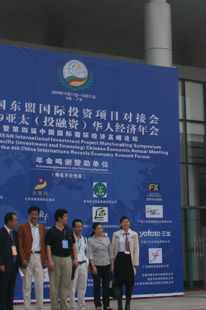New markets to boost Chinese multinationals: experts
In the post-financial crisis era, sales in new, emerging markets will boost the recovery of Chinese enterprises, experts said, October 18. The development of Chinese companies into multinational corporations is a new trend in world economic growth.
 |
|
The 2009 Chinese World Economy Forum is held in Nanning. |
Speaking at the 2009 Chinese World Economy Forum in Nanning, capital of Guangxi Zhuang Autonomous Region, Zeng Peigan, chairman of the China New Economy Research Center, said turbulence in the US economy had caused a structural adjustment and drastic changes of the world's consumption pattern.
"A huge bubble burst in the crisis and people have come to see the drawbacks intrinsic in the financial setup," he told China.org.cn. "Consequently, the savings rate rose and consumption rate fell in the U.S. For the Chinese economy and Chinese firms, the greatest challenge is how to cope with such changes."
Professor Mao Yushi, chairman of the Unirule Institute of Economics and a former Harvard professor, said China should adjust its savings rate and consumption rate using taxation and long-term development policies.
"The Chinese economy will continue to rely on the export market to spur its growth on the one hand, but on the other hand, it will depend on domestic consumption and opening up the country's domestic market,"he said.
Mao said both the expansion of manufacturing sector, like low-end industry, and newly emerging industries, including services, are important factors in economic recovery.
But does China’s manufacturing sector have room for expansion? China's stimulus measures and aggressive lending policies have helped the country's manufacturing sector to expand for the first time since July, according to a survey by Hong Kong brokerage CLSA.
The CLSA Purchasing Managers' Index, which surveys manufacturing conditions among industry managers, improved markedly in April, to 50.1, compared with 44.8 in March. A reading above 50 indicates expansion, while a reading below 50 signals contraction.
"As manufacturing industry needs to be improved, so the space for the growth of financial institutions and other trades will also increase,"Mao told China.org.cn.
Jia Xuelu, chief partner in the Macao Express Investment Group Ltd, agreed with Mao. "People should work hard to develop newly emerged industries, including services, but low-end industry is the basis for long-term growth in the economy,"she said. "As long as poor people account for the majority of the world’s population, the market share of low-end industries will continue to grow. The biggest global market is still the small commodities market."
She said Chinese enterprises should develop top brands so as to gradually replace such luxuries such as Italian shoes and hosiery.
With increasing fierce market competition around the globe, "China is sure to face more serious and tougher competition since other newly-emerged economies are also seeking to expand,"Jia said. "Special attention should be given to the development of all trades."
Since newly-emerging markets will take a greater share in the post-crisis economy, "People should widen their worldwide vision and get acquainted with up-to-date information about these markets, so as to help Chinese enterprises expand on the global market,"Chinese economist Fan Gang said.
He said newly-emerging markets would boost the Chinese economy and the internationalization of Chinese companies in the post-crisis period.
 0
0 







Comments